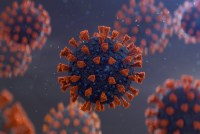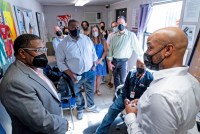Americans With HIV Are Living Longer. Federal Spending Isn’t Keeping Up.
Advances in medicine mean more people are living longer with HIV. But aging with HIV comes with an increased risk of health complications, and many worry the U.S. health care system isn’t prepared to treat this growing population.
Toxic Gas That Sterilizes Medical Devices Prompts Safety Rule Update
The Environmental Protection Agency is tightening regulation of ethylene oxide, a carcinogenic gas used to sterilize medical devices. The agency is trying to balance the interests of the health care industry supply chain with those of communities where the gas creates airborne health risks.
Mental Health Courts Can Struggle to Fulfill Decades-Old Promise
Mental health courts have been touted as a means to help reduce the flow of people with mental illness into jails and prisons. But the specialized diversion programs can struggle to live up to that promise, and some say they’re a bad investment.
PrEP, a Key HIV Prevention Tool, Isn’t Reaching Black Women
New HIV infections occur disproportionately among Black women, but exclusionary marketing, fewer treatment options, and provider wariness have limited uptake of preexposure prophylaxis, or PrEP, drugs, which reduce the risk of contracting the virus.
In Move to Slash CDC Budget, House Republicans Target Major HIV Program Trump Launched
Republicans in Congress have proposed substantial cuts to the budget of the Centers for Disease Control and Prevention, taking aim at one of former President Donald Trump’s major health programs: a push to end the HIV epidemic in the U.S.
Artificial Intelligence May Influence Whether You Can Get Pain Medication
To contain the opioid crisis, health and law enforcement agencies have turned to technology to monitor doctor and patient prescription data. Experts have raised questions about how these systems work and worry about their accuracy and potential biases. Some patients and doctors say they’re being unfairly targeted.
The CDC Works to Overhaul Lab Operations After Covid Test Flop
In early 2020, U.S. public health labs received covid-19 tests from the Centers for Disease Control and Prevention that were flawed, as a result of poor design and contamination. Now the CDC is overhauling its lab operations, but efforts to be better prepared for future threats won’t be easy, observers say.
As Federal Emergency Declaration Expires, the Picture of the Pandemic Grows Fuzzier
The pandemic gave federal officials expanded power to access crucial data about the spread of covid-19, but that authority will change when the public health emergency sunsets in May. That, along with the end of popular covid trackers, will make it harder for policymakers and the public to keep an eye on covid and other threats.
¿Se podrá cumplir con la meta de terminar con la epidemia de VIH para 2030?
Debido a las interrupciones de la pandemia, los funcionarios federales no han tenido estimaciones sólidas de nuevas infecciones o el número de personas que viven con VIH desde finales de 2019.
US Officials Want to End the HIV Epidemic by 2030. Many Stakeholders Think They Won’t.
The federal government’s ambitious plan to end the HIV epidemic, launched in 2019, has generated new ways to reach at-risk populations in targeted communities across the South. But health officials, advocates, and people living with HIV worry significant headwinds will keep the program from reaching its goals.
¿Ayudan las nuevas guías sobre opioides a los pacientes con dolor crónico?
Las recomendaciones dejaron a muchos pacientes lidiando con las consecuencias para la salud mental y física de la reducción rápida de la dosis o la suspensión abrupta de los medicamentos que habían estado tomando durante años, lo que conlleva riesgos de abstinencia, depresión e incluso suicidio.
New CDC Opioid Guidelines: Too Little, Too Late for Chronic Pain Patients?
In November, the Centers for Disease Control and Prevention released new guidelines for prescribing opioids for pain, allowing physicians more flexibility. But doctors, patients, and advocates wonder if the updated standards will be too little, too late to help chronic pain patients in a country still focused on fighting the ongoing opioid crisis.
Jimmy Carter se enfrentó al horrible gusano de Guinea cuando nadie más lo hizo. Y ganó
El Centro Carter informó que en 2022, solo hubo 13 casos humanos registrados de la enfermedad, un número provisional que se confirmará oficialmente, probablemente este mes.
Jimmy Carter Took on the Awful Guinea Worm When No One Else Would — And Triumphed
The effort to end Guinea worm disease relies almost entirely on changes in people’s behavior. There is no cure, no vaccination. When the 39th president of the United States left office, Jimmy Carter campaigned to eradicate the disease.
Congress Told HHS to Set Up a Health Data Network in 2006. The Agency Still Hasn’t.
Since 2006, federal officials have been charged with setting up a network to let various parts of the U.S. health system share information during emergencies. It still hasn’t been built or even planned, even after the communication and data-sharing failures put on display during the pandemic.
¿Clínica de urgencias o sala de emergencias? Cómo decidir donde recibir la atención adecuada
Las personas heridas o enfermas deben decidir con cuidado, en un momento de estrés, cuál es el mejor lugar para buscar ayuda. Y deben tomar esa decisión en medio de un número creciente de opciones.
The Decision of Where to Seek Care Is Complicated by the Multitude of Options
The proliferation of care options — particularly urgent care centers and free-standing emergency departments — can make the head spin. Facilities have little incentive to clear up the confusion of where to go. But for patients, the wrong choice can mean big bills and possibly poor health outcomes.
Much of the CDC Is Working Remotely. That Could Make Changing the Agency Difficult.
Like many U.S. workplaces, the Centers for Disease Control and Prevention went remote during the pandemic. Most of the agency’s staff members haven’t returned to the office full time, raising concerns about the CDC’s ability to reform itself after recent stumbles.
Path Cleared for Georgia to Launch Work Requirements for Medicaid
Federal officials have apparently stopped fighting Georgia’s plan for a limited Medicaid expansion that includes work requirements. The plan, a key policy of Republican Gov. Brian Kemp’s, would cover a much smaller portion of the population: those who can work or volunteer 80 hours a month.
‘Impending Intergenerational Crisis’: Americans With Disabilities Lack Long-Term Care Plans
Many Americans with intellectual and developmental disabilities do not have long-term plans for when family members can no longer care for them. Families, researchers, and advocates worry that has set the stage for a crisis in which people with disabilities could end up living in institutional settings.






















